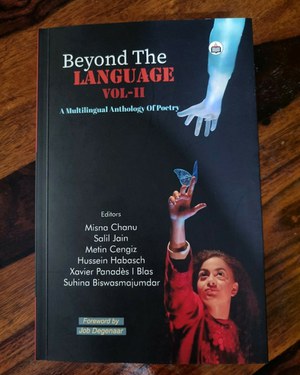Photo: Savanth Sunil, ontwerp cover: Misna Chanu
De Indiase dichteres Misna Chanu en vijf mederedacteuren stelden een poëziebloemlezing samen in zeven talen, het Hindi, Manipuri, Portugees, Turks, Servisch, Koerdisch en Catalaans, als opvolger van de succesvolle Volume-I-bundeling. Ik kreeg de eer een voorwoord daarvoor te schrijven. Het boek verscheen bij Author's Press, ISBN 978-93-5529-718-1, USD 30.
Foreword Beyond the language II
The importance of language
The art of writing is a powerful weapon. In his play Cardinal Richelieu, the English author Edward Bulwer Lytton (1803 -1873) wrote the famous quote: ‘The pen is mightier than the sword’. In communication among people, especially in troubled times, the art of writing plays an important role. When the Chinese sage Confucius (551 - 479 BC) was asked: ‘What would you do if you were called to rule a country?’, he replied: ‘Purify the language!’ To the quite surprised audience he clarified his statement: ‘When the language is not pure, then what is said is not the same as what is meant. In that case, the things that need to be done remain undone. The result is that morals and the arts are deteriorating, justice disappears and people find themselves in hopeless confusion. It is a thing of main interest.’
Poetry
One of the beautiful tools of language is poetry. A poem is a valuable thing, but it is also fragile. And, as the Dutch poet Lucebert (1924-1994) said, ‘Every valuable thing is defenceless.’ You can destroy a poem by deleting non-omittable words or adding the wrong words. In my opinion reading poetry fits in a wonderful way into our lives, when we are too busy to take time for our language. You can read an average length of a poem within a few minutes, but you will receive a lot of information!
The lonely road of the poet
In many, especially Western cultures, people are less interested in poetry than in many other forms of expression. A very famous poem, The Road Not Taken, written by the American writer Robert Frost (1864 -1963), tells about a dilemma when choosing a road in a yellow wood. There are two paths, one is passable and grassy, the other one is ‘less traveled by’. The poem ends with these lines: I shall be telling this with a sigh/ Somewhere ages and ages hence:/ Two roads diverged in a wood, and I—/ I took the one less traveled by,/ And that has made all the difference. I think that poets always choose less passable roads.
Aspects of poetry
Poetry, as you know, contains not just meaning, but also sound, rhythm, metaphors, expressions and form. All these elements play an obvious role in the communication between writer and reader. Together, these aspects form a higher unity, similar to lovers who merge into one another. Fine poetry goes wild and, in the best case scenario, so does the reader or listener. It could be the task of a poet to heal the language and use it in a pure way. The result of this, the final version of a poem, is unique: in fact, translating is creating another poem in an other language.
Beyond the language II
In Beyond the language, Volume I there were writers from seven main languages of the world, translated into English. Now we have a follow-up that combines six additional languages and the mother tongue of the compiler, Mrs. Chanu, as well as translations into English.
Collecting, selecting, translating and publishing poetry is a great enterprise. When reading the poems in this multilingual anthology, you will see that there are many more similarities between cultures than differences. In that way poetry is a bridge between all cultures. There are overwhelming poems in it, personal evocations, poems about natural beauty, humanitarian verses, fine melancholic verses and engaged messages in a search for a better world. Together, they form a multicoloured array of talents, similar to the variety of bird calls that you can hear on a walk through a summer forest in the early morning or evening.
Our world is full of problems, and sometimes we need to know our values at all times. One of these values is poetry. Dear Reader, enjoy the poems in front of you and you will realize that the artists behind the poems have lots in common with you. In the end it is the language in which we can find each other. Mrs. Chanu, her editors and all the poets who have contributed to this volume have, in a wonderful way, succeeded in the challenge of reaching this uniting goal.
Job Degenaar (Dutch poet and president of PEN Emergency Fund)

